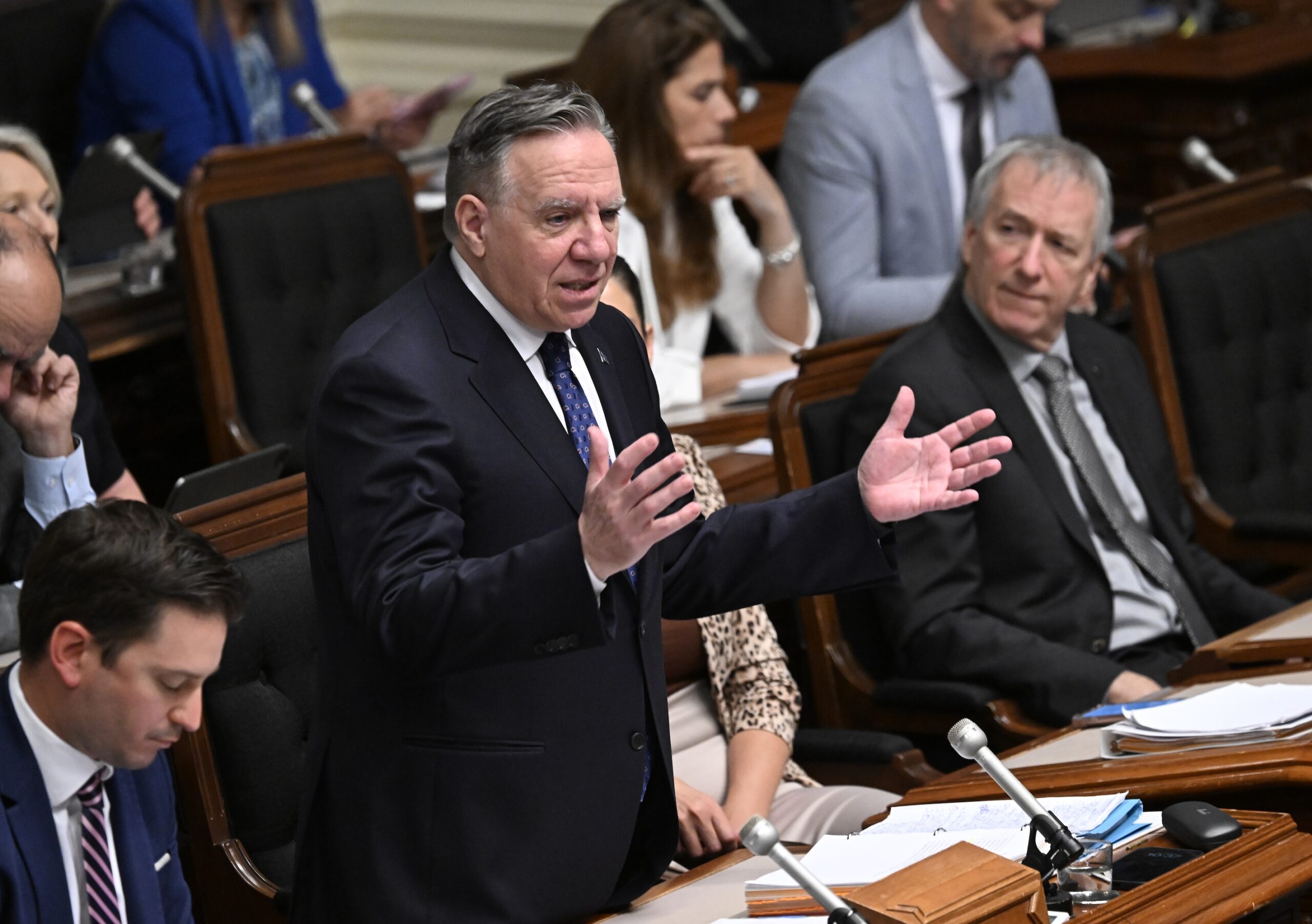On Friday, June 7, the National Assembly adjourned for the summer after a tumultuous start to the legislative session.
The session was marked by significant financial challenges and political controversies. The provincial government faced a substantial budgetary shortfall, with the deficit reaching $11 billion, surpassing even the levels seen during the pandemic.
In addition to fiscal issues, Premier Legault had to address mounting allegations that mayors were pushed to pay for access to cabinet ministers raising concerns about the integrity of the political process. In response to these allegations, Legault made the decision to refuse any donations to his party.
After a significant drop in ratings for the Coalition Avenir Québec Party over the past 6 months, results of the latest Léger poll show the party gaining three points to 25 per cent. However, the Parti Québécois is still leading the pack with 32 per cent in recent polls.

Meanwhile, the Parti Libéral du Québec’s leadership election will be held in spring 2025, with Interim Leader Marc Tanguay currently the favourite to become the next party leader, with 30 per cent support, significantly higher than former Montreal mayor Denis Coderre, currently at 12 per cent. The next Québec provincial general election is scheduled for October 5, 2026, leaving a lot of room for change.
Health care
Investments in the health care system were one of the most significant expenditures for the 2024-25 budget with an increase in spending of 4.3 per cent over the previous year. In the budget, $3.7 billion was allocated to help improve access to health care, health services and reduced wait time at emergency rooms.
The rollout of Santé Québec proved to be a complex task, with controversies regarding the choice to appoint hotel magnate Christiane Germain chairperson of the board of directors and the $173,000 annual remuneration of the role, a compensation four times higher than anticipated a year ago. The PQ accused the government of misusing public funds, pointing out that the head of Santé Québec, Geneviève Biron, will earn more than $652,000 for the first two years of her mandate. Québec Solidaire also noted the absence of individuals with social services experience on the board.
The Santé Québec transition board will release its first progress report in May 2025, with subsequent reports scheduled for September 12 and December 12, 2025.
To tackle emergency room wait times, the Québec government plans to establish a ‘flying squad’ of healthcare professionals. This initiative aims to reduce the system’s dependence on private agencies to address staffing shortages. The government has partnered with the Confédération des syndicats nationaux (CSN) and the Fédération des travailleurs et travailleuses du Québec (FTQ) to combat the severe staffing deficits in various regions. The team will consist of nurses and orderlies.
Infrastructure
The government of Québec introduced the updated 2024-2034 Québec Infrastructure Plan, with an anticipated $153 billion in investments in infrastructure improvements targeting education, health and social services, road networks and public transit, and social and community housing. Revitalizing Québec’s aging infrastructure has been a priority for Premier Legault since his first term, when his government enacted legislation aimed at accelerating certain infrastructure projects in the established priority areas. However, progress on the expedited projects has been slow, with recent reporting showing that out of 182 projects, only 42 have been completed since the bill was passed in 2020. Progress on education, hospital modernization and road network-related projects has been particularly slow, with no projects reaching completion.
Meanwhile, in a report tabled at the National Assembly, Auditor General Guylaine Leclerc showed that conditions of the province’s public colleges have worsened in the last five years, and the higher education ministry’s budget covers less than half of the amount needed to reverse the trend. The proportion of buildings classified as being in bad or very poor condition increased from 24 per cent in 2019 to 65 per cent this year.
Although the government allocated just over $608 million for CEGEP infrastructure maintenance between 2023 and 2028, Leclerc estimates that $1.7 billion is needed. The crisis in the education sector was compounded by the closure of approximately 800 public schools in Québec due to a strike by the Fédération autonome de l’enseignement (FAE) this fall, during which 368,000 students missed 22 days of school. Minister Drainville mentioned that the full extent of the impacts would only become clear in 2025.
Energy and Natural Resources
The energy situation in Québec has been intensifying, adding pressure on the CAQ government to identify solutions, and contributing to increasingly strained relations between Minister Fitzgibbon and the CEO of Hydro-Québec, Micheal Sabia. A recent study from the Manufacturers and Exporters of Québec (MEQ) found that of 114 companies surveyed, 73 per cent will have to delay their planned projects or investments due to electricity shortages.
A key piece of the government’s plan to address energy shortages was introduced as the 2024 spring session approached its conclusion with the introduction of Minister Fitzgibbon’s energy reform legislation, Bill 69. The new legislation will allow private distributors of electricity to sell their power to neighbouring customers if those jurisdictions can demonstrate they are able to build the connection to the electrical grid on their own.
Additionally, rate increases for electricity will be held to a maximum of three per cent until Québec provincial election in 2026. Starting in April of 2026, the Régie de l’énergie should set “one or more rates” to “encourage the reduction of electricity consumption during peak periods,” allowing Hydro-Québec to charge more for electricity at peak consumption times.
Bill 69 was introduced on the second-to-last day of the session and will be studied in the fall when MNAs return. Over the summer it is expected that consultations with key stakeholder will take place.
In the short term, the government and Hydro-Québec will continue to pursue alternative energy solutions. The possibility of partnerships with other jurisdictions and customers will be evaluated by the province and its energy regulator, as well as the role of private energy production. An integrated energy resource management plan will be introduced in the next year or so, to support the deployment of the energy reform bill.
Rumours of Minister Fitzgibbon’s early resignation have begun to emerge over the last couple of months, with Fitzgibbon himself admitting that he may leave before his mandate is over. That said, the minister and his inner circle have confirmed that he intends to stick around until at least 2026 to oversee the passage and early implementation of the energy reform measures.
The social acceptability of major economic development, energy and natural resources projects has been a key point of contention for Québec’s politicians. Civil society groups have grown increasingly opposed towards major projects, most recently targeting the Northvolt battery plant, one of Québec’s most important projects for the development of the battery industry. Concerns stemmed from the potential environmental impact of the project and the lack of formal public consultation process (BAPE). This past session, the government attempted to address some of this public outcry by introducing legislation intended to bring about a series of reforms to Québec’s mining laws, which among other things, would require a mandatory BAPE for all new mines.
Legislative update
- Bill 51, An Act to modernize the construction industry: Assented May 28, 2024.
- Bill 41, An Act to enact the Act respecting the environmental performance of buildings and to amend various provisions regarding energy transition: Assented March 27, 2024.
- Bill 31, An Act to amend various legislative provisions with respect to housing: Assented February 21, 2024.
- Bill 65, An Act to limit lessors’ right of eviction and to enhance the protection of senior lessees: Assented June 6, 2024.


